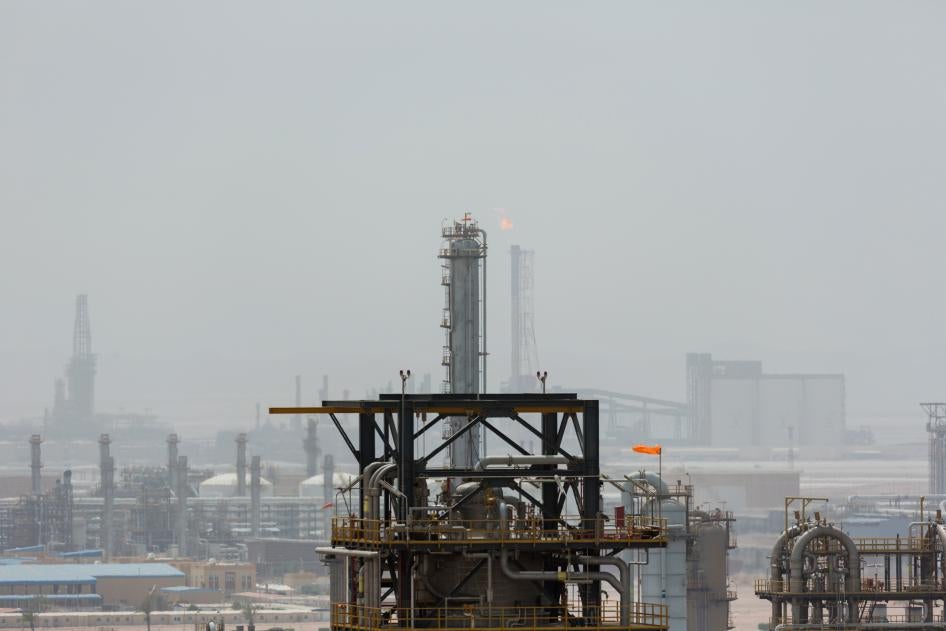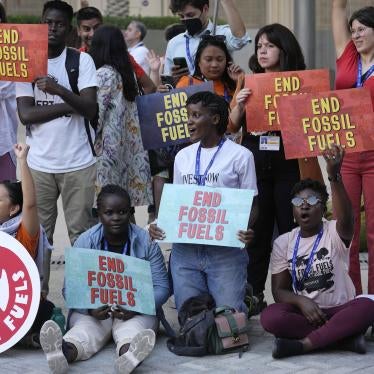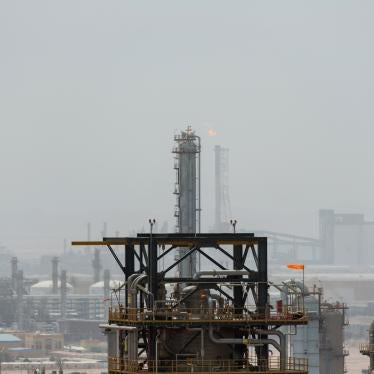(Beirut) – The UN’s annual climate conference, COP28, finally acknowledged the need to transition away from fossil fuels but fell short of a clear and time-bound commitment to phase out fossil fuels as the main driver of the climate crisis, Human Rights Watch said today.
“Finally naming fossil fuels in a COP outcome is a long-overdue recognition of the industry that’s primarily responsible for the climate crisis,” said Richard Pearshouse, environment director at Human Rights Watch. “But governments fell short of making the urgent and time-bound commitment the world needs to confront the climate crisis and to uphold human rights.”
The Global Stocktake text, a key outcome document, calls on countries to start “transitioning away from fossil fuels” but falls short of committing governments to actually phase out fossil fuels and leaves important loopholes, allowing the fossil fuel industry to continue polluting. While this was the first time in more than 30 years of the UN Framework Convention on Climate Change that a decision explicitly mentions “fossil fuels,” it fails to meet what is necessary to contain the global temperature rise to 1.5 degrees Celsius, and avoid the worst impacts of the climate crisis, Human Rights Watch said.
Fossil fuels are the primary driver of the climate crisis and can be linked to severe human rights harm at all stages of development. Frontline communities have long borne the brunt. It is a human rights imperative to phase out fossil fuels, Human Rights Watch said. The International Energy Agency agrees that there cannot be any new fossil fuel projects if countries are to meet existing climate targets and avert the worst consequences of the climate crisis. But governments have largely failed to act, which will have devastating consequences for the planet and human health.
In the lead up to COP28, more than 80 countries had supported the call to phase out all fossil fuels. For years, a growing global movement of frontline communities, Indigenous peoples, civil society organizations, environmentalists, workers, scientists, health providers, human rights advocates and others have called on governments to uphold rights and finally commit to a fair, fast, full, and funded phase out of all fossil fuels.
Many governments have instead defended and supported fossil fuel expansion. During COP28 the Organization of the Petroleum Exporting Countries (OPEC) apparently urged its members and allies to “proactively reject any text or formula that targets energy, i.e. fossil fuels, rather than emissions.”
The UAE’s criminalization of freedom of assembly, closure of civic space, and repression of critics limited meaningful participation of activists and human rights defenders in climate negotiations. Human Rights Watch recently documented toxic air pollution from the fossil fuel industry in the UAE, substantially contributing to the country’s burden of preventable death and disease.
Climate activists were unable to march outside of the official COP28 venue as protests are illegal in the UAE. Advocacy actions and protests within the UN-run “blue zone” were also severely limited, with unprecedented restrictions on freedom of speech from the UNFCCC Secretariat. For example, an action aiming to draw attention to the imprisonment of human rights defenders in the host country was delayed multiple times and organizers learnt about new restrictions on its content only a few minutes before the action. Organizers of a march on December 9 calling for climate justice and expressing solidarity with Palestinian civilians killed in Gaza had to ask participants to comply with the UN’s limitations of speech to avoid a cancelation of the protest action.
For this and future climate COPs, the UNFCCC should make the host agreement public and ensure that it complies with international human rights law. The UN should set human rights criteria for future COP hosts including an obligation to realize the rights to freedom of speech and assembly that are preconditions to ensure an ambitious COP outcome. The UN should also ensure that interests of the fossil fuel industry do not undermine the credibility and outcome of the negotiations at future COPs.
Next year’s annual climate conference, COP29, will be hosted by Azerbaijan, another petrostate with a deeply repressive government fueled by an oil and gas industry which provides most of the government’s revenue. Freedom of expression and association are severely curtailed, and protests are swiftly and often brutally dispersed. A new crackdown on independent media has resulted in the arrests of at least 6 journalists in recent weeks on bogus smuggling and other charges.
“Holding COP29 in yet another petro-autocracy is a deeply worrying sign for the phase out of fossil fuels,” Pearshouse said. “Unless the UN and its member states are getting serious about human rights standards for COP hosts, we can’t expect any meaningful pressure from civil society for an ambitious COP29 outcome.”








